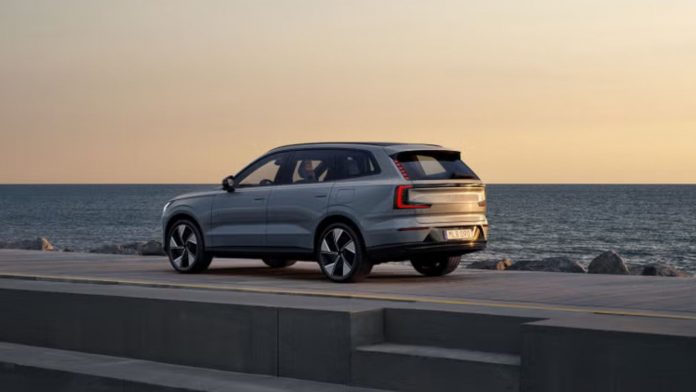Volvo is positioning itself for a significant comeback in the U.S. electric vehicle (EV) market by launching two new electric SUVs—the flagship three-row EX90 and the smaller, more affordable EX30. Despite delays, these models are set to hit the U.S. market soon, with the EX90 arriving later this year and the EX30 following in the second half of 2025. Volvo is banking on these next-generation EVs to reverse its recent decline in U.S. EV sales.
In the first half of 2024, Volvo’s U.S. electric vehicle sales plummeted by 72%, with only 2,109 units sold, down from over 7,600 in the same period last year. This sharp decline reduced Volvo’s U.S. EV market share from 0.4% to 0.3%. However, Volvo Cars U.S. President Michael Cottone is optimistic that introducing the EX90 and EX30 will quickly turn things around.
The EX90 is a significant milestone for Volvo as it is the company’s first vehicle designed and developed outside of Europe and is specifically tailored for the U.S. market. This seven-seat electric SUV, built in South Carolina, is expected to play a key role in boosting Volvo’s presence in the U.S. EV market. With its XC90-like design, the EX90 is seen as a future classic, much like the Range Rover or Porsche 911.
The EX90 will start at $81,290, following a price increase due to higher tariffs on its CATL-made battery. Despite the higher price point, Volvo is confident that the EX90 will attract a new segment of consumers, particularly those who favor traditional SUV designs over the more futuristic aesthetics of competitors like the Tesla Model X.
On the other end, the EX30 will arrive in 2025 and will be Volvo’s most affordable EV, with a starting price of $34,950. Already a top European seller, the EX30 is expected to have a similar impact in the U.S., appealing to budget-conscious consumers looking for an entry-level electric SUV.
Volvo’s EX90 and EX30 are launching at a crucial time when the U.S. market shows strong demand for electric SUVs, especially in the three-row segment. With Ford pulling out of the three-row electric SUV race and competitors like Kia gaining ground, Volvo sees a significant opportunity to capture market share.
The EX30’s success in Europe, where it was the second-best-selling EV in July 2024, indicates that Volvo’s strategy is on the right track. The company now hopes to replicate this success in the U.S. market, anticipating a strong response to its new electric SUVs. As Volvo rolls out these models, it expects a swift turnaround in its U.S. EV sales, positioning itself as a key player in the evolving automotive landscape.



